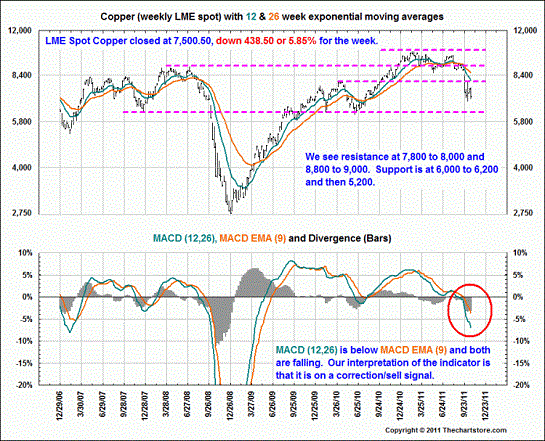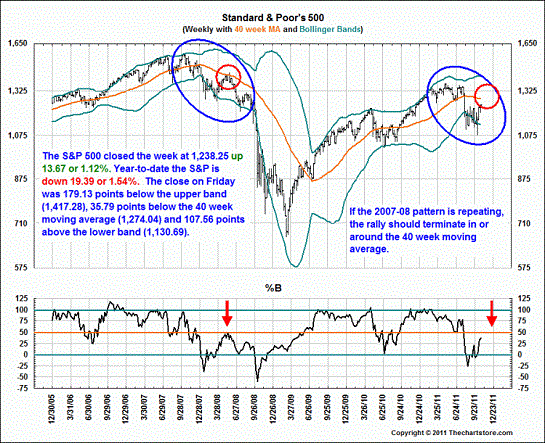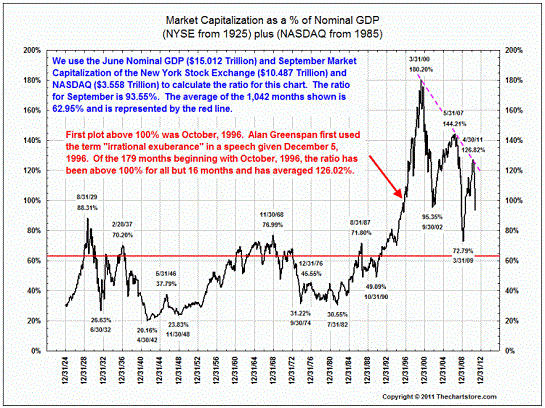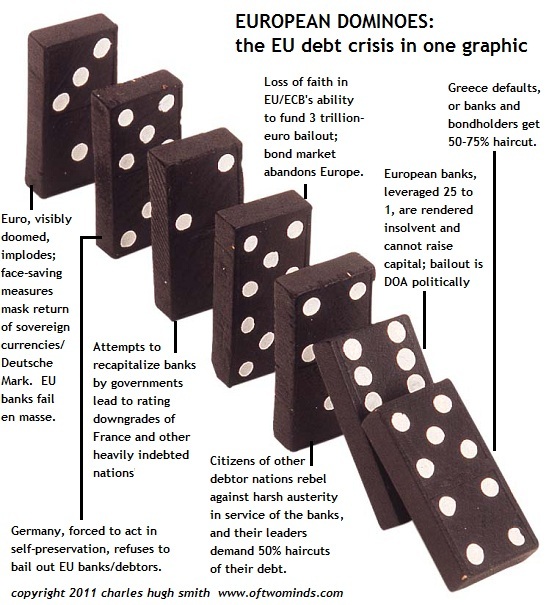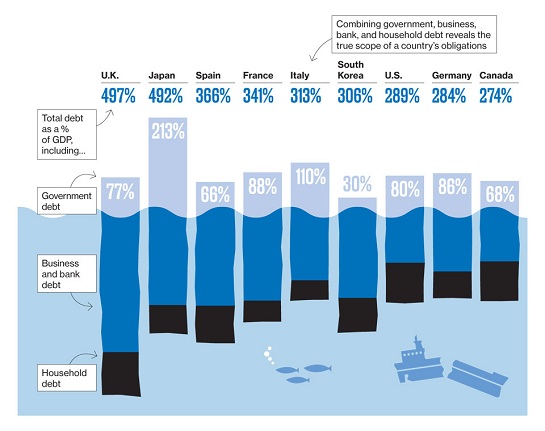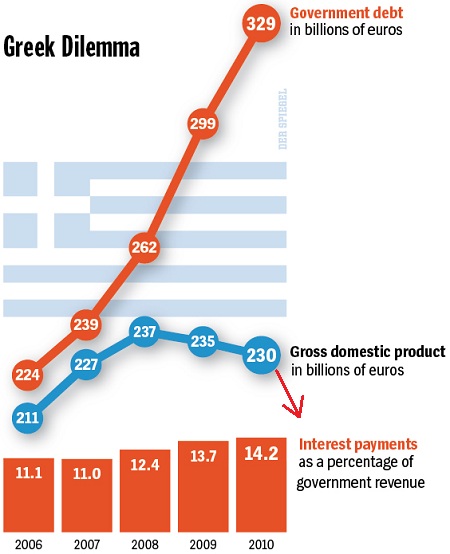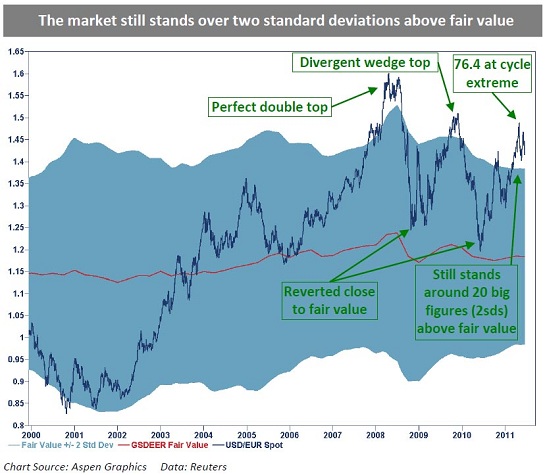A Simple Three-Item Agenda for "Occupy Wall Street/We Are 99%"
There are really only three ways to cripple Wall Street's democracy-killing concentration of wealth and power: take our money out of Wall Street and the TBTF banks, eliminate private money from elections and abolish Wall Street's dealer, the Federal Reserve.
There are only three things--and only these three--that will cripple Wall Street's democracy-killing concentration of wealth and power:
1. Transfer the 99%'s money out of Wall Street and the Too Big To Fail Banks
2. Remove campaign contributions from our democracy in a way that the corporate legalist lackeys in the Supreme Court cannot overturn, i.e. entirely publicly financed elections
3. Abolish Wall Street's dealer, pusher and protector, the Federal Reserve.
My reasoning is very simple:
Everything else people want to see happen cannot happen if:
1) Wall Street and the SDI (systemically dangerous institutions) a.k.a. too big to fail banks, control most Americans' financial assets and debts
2) The Federal Reserve exists to enable and protect the SDI's wealth and power via Primary Dealers, the discount window and other pusher/dealer mechanisms
3) Wall Street and the other SDIs can use the billions of dollars they skim from our accounts, IRAs, 401Ks and pensions to buy political influence and protection from regulation and competition.
Therefore these are the necessary foundations of any real change.
As long as Wall Street and the other SDIs control much of the nation's financial markets, assets and debts, and the Federal Reserve exists to protect and enable their predation and parasitic skimming, they will have the means to reap billions in profits which can then be funneled into our cash-corrupted political system of for-sale toadies and apparatchiks.
The only real leverage we have is our money and our compliance. Leaving our money in Wall Street and the Too Big to fail banks enables their dominance. Leaving our money in checking accounts, money market funds, savings accounts and brokerage accounts, and then using credit and debit cards issued by the SDIs, is to remain deeply complicit in their dominance.
This concept is now entering the cultural dialog, for example this recent entry on Zero Hedge: Want To Defeat The Banks? Stop Participating In The System!
Frequent contributor Harun I. summed the argument up even more forcefully:
I applaud this movement only if people are coming to the recognition that, collectively, we as a nation have been wrong and now need to move in a different direction. We must now engage in discussing how best to do so.
However, I remain skeptical. Why are the TBTF banks still operating? From fraud to extortion to money laundering for drug cartels, the list of crimes against humanity is quite clear and long. Exactly what does it take before people will stop doing business with demonstrably corrupt entities?
And now there is a General Strike scheduled. I am all for it. But understand that our government will borrow the shortfall and nothing meaningful other than an increase in public debt will occur.
However, if you want to see an instantaneous and dramatic effect, every person close every account they have with all the TBTF banks and their subsidiaries on the same day.
Immediately or almost immediately they would have to be taken into receivership, their assets marked to market and sold off. The End.
Why destroy the TBTF banks? Most of them are Primary Dealers. The Fed then comes under pressure as it becomes the only lender of resort.
Then, once we have gotten their attention we tackle monetary reform, lobbying, and term limit in Congress and the Supreme Court.
It is time for government to "fear the people". Rest assured that if government does not fear the people, nothing will change.
As for the Supreme Court's legalist worship of the Corporate State: I believe this court will be remembered by history as the court which veered close enough to Corporate-State fascism to give it a big wet kiss. Corporate "rights" of personhood? No problem, you got it! The "right" to fund unlimited campaign contributions? No problem, you got it!
"Fascism should more properly be called corporatism because it is the merger of state and corporate power." Benito Mussolini
We might profitably ask how the Founding Fathers would have responded to calls that the U.S. Constitution should contain a clause granting the East India Company the same rights of personhood as U.S. citizens, and then further granting it the unlimited right to buy political favors as a function of "free speech."
One wonders how any of the Revolutionary War veterans among the Founding Fathers might have responded to such toadying claptrap. Yet this is precisely what the corporate toadies in the flowing black robes claim is "defended" by the U.S. Constitution.
A close reading of the Constitution reveals no amendments or clauses granting private corporations personhood, or granting them the right to inject unlimited sums of money to sway elections. If we turn to the Federalist Papers, we find fear of a "tyranny of the minority"--and what is a private corporation but an extreme minority bent on purchasing a limited but oppressive, exploitative and parasitical tyranny?
The legalist lackeys on the Supreme Court have hidden far too long behind the reputation of the Court--a reputation punctured by history, we might note--as a forum of disinterested legal debate. Rather, the court is nothing but another collection of imperfect human beings who are easily swayed by the tenor of the times and the ideological agendas of the wealthy and powerful. ("These are not the campaign reforms you're looking for. Move along.")
Given that we have a court that worships Corporate-State fascism slicked over with a thin veneer of democracy for public relations purposes--every single attempt to limit corporate campaign contributions has been struck down by the court--then our only choice as a people is to ban all private money contributions and institute a system of 100% publicly financed elections. Yes, it's imperfect, and yes, it's messy and costly, but nowhere near as corrupting and costly to liberty as the Corporate-State fascism we now endure.
Libertarians may be aghast at this option, but we have been reduced by the legalist lackeys in the Supreme Court to this choice: either we continue to be ruled by the corrupting corporate-State nexis of unlimited corporate/private Elites funding of elections, or we go with public financing. Thanks to the Supreme Court, there is no other choice.
As a lagniappe thought: one of the primary concerns of many "OWS/we are the 99" supporters is rising income disparity. That is a legitimate concern in any nation claiming to be a democracy with a free-market economy. Yet a close examination of the roots of income disparity and rising poverty leads straight to the Federal Reserve.
Winners And Losers: The New Economy (Zero Hedge)
What Mr. Gross and Mr. Frank and many others don't see is that it is the creation of fiat money that destroys wealth and misdirects the investment of capital into less productive assets. That is, monetary inflation destroys capital (wealth). The reason why the production of goods and services do not bear higher yields than financial assets is that the production of goods and services suffers from a lack of real capital. Remember that real capital comes only from the saved profits of production and from the savings of workers from wages earned in production.
You obviously cannot print wealth, but if you try that fiat money distorts the entire economy by directing investment to things which appear to appreciate but what is really happening is that the dollar is depreciating. As a result, fiat money and real capital are invested in financial assets because they appear to have greater yields than returns from the production of goods. Prices rise (price inflation) and it creates the inevitable boom which always busts. The fall out is that we are stuck with things people don't want (in the present re/depression it is housing). And we fall for it every time.
Allow me to simplify the argument:
1. The Federal Reserve has financialized the economy as an intrinsic expression of its reason for being.
2. Financialization necessarily creates systemically rising income disparity.
I think that's all we need to understand to grasp the utmost importance of abolishing the Federal Reserve, a private banking monopoly created and protected by our Congress. Limiting Wall Street and the TBTF banks is structurally impossible as long as the Federal Reserve exists.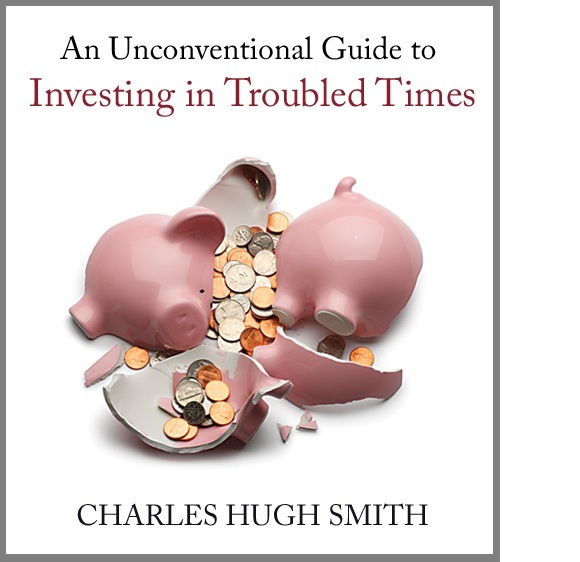
If this recession strikes you as different from previous downturns, you might be interested in my new book An Unconventional Guide to Investing in Troubled Times (print edition) or Kindle ebook format. You can read the ebook on any computer, smart phone, iPad, etc.Click here for links to Kindle apps and Chapter One. The solution in one word: Localism.
My Big Island Girl (song) Buy fromCD Baby or amazon.com (99-cent MP3 download)
Readers forum: DailyJava.net.
My new book is available in both print and ebook formats: An Unconventional Guide to Investing in Troubled Times (print edition) or Kindle ebook format. You can read the ebook now on any computer, smart phone, iPad, etc. Click here for links to Kindle apps and Chapter One.
Order Survival+: Structuring Prosperity for Yourself and the Nation (free bits) (Mobi ebook) (Kindle) or Survival+ The Primer (Kindle) or Weblogs & New Media: Marketing in Crisis (free bits) (Kindle) or from your local bookseller.
Of Two Minds Kindle edition: Of Two Minds blog-Kindle
| Thank you, Carl R. ($5/mo), for your extremely generous subscription to this site -- I am greatly honored by your support and readership. | Thank you, Travis G. ($10/mo), for your marvelously generous subscription to this site -- I am greatly honored by your support and readership. |





















